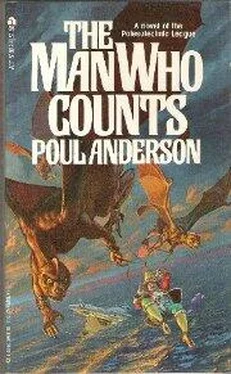Tolk translated fast, in a low voice. When he had finished, Trolwen sighed.
“I hate to admit it,” he said, “but if you turn that marswa’s words around, they are true. Do you really, seriously think two races as different as ours could live side by side? It would be too tempting to break the pledges. They could ravage our land while we were gone on migration, take all our towns again… or we could come north once more with barbarian allies, bought with the promise of Drak’ho plunder — We’d be back at each other’s throats, one way or another, in five years. Best to have it out now. Let the gods decide who’s right and who’s too depraved to live.”
Almost wearily, he bunched his muscles, to go down fighting if T’heonax ended the armistice this moment.
Van Rijn lifted his hands and his voice. It went like a bass drum, the length and breath and depth of the castle raft. And nocked arrows were slowly put back into their quivers.
“Hold still! Wait just a bloody minute, by damn. I am not through talking yet.”
He nodded curtly at Delp. “You have some sense, you. Maybe we can find a few others with brains not so much like a spoonful of moldy tea sold by my competitors. I am going to say something now. I will use Drak’ho language. Tolk, you make a running translation. This no one on the planet has heard before. 1 tell you Drak’ho and Lannacha are not alien! They are the same identical stupid race!”
Wace sucked in his breath. “What?” he whispered in Anglic. “But the breeding cycles—”
“Kill me that fat worm!” shouted T’heonax.
Van Rijn waved an impatient hand at him. “Be quiet, you. I make the talkings. So! Sit down, both you nations, and listen to Nicholas van Rijn!”
The evolution of intelligent life on Diomedes is still largely conjectural; there has been no time to hunt fossils. But on the basis of existing biology and general principles, it is possible to reason out the course of millennial events.
Once upon a time in the planet’s tropics there was a small continent or large island, thickly forested. The equatorial regions never know the long days and nights of high latitudes: at equinox the sun is up for six hours, to cross the sky and set for another six; at solstice there is a twilight, the sun just above or below the horizon. By Diomedean standards these are ideal conditions which will support abundant life. Among the species at this past epoch there was a small, bright-eyed arboreal carnivore. Like Earth’s flying squirrel, it had developed a membrane on which to glide from branch to branch.
But a low-density planet has a queasy structure. Continents rise and sink with indecent speed, a mere few hundreds of thousands of years. Ocean and air currents are correspondingly deflected; and because of the great axial tilt and the larger fluid masses involved, Diomedean currents bear considerably more heat or cold than do Earth’s. Thus, even at the equator, there were radical climatic shifts.
A period of drought shriveled the ancient forests into scattered woods separated by great dry pampas. The flying pseudo-squirrel developed true wings to go from copse to copse. But being an adaptable beast, it began also to prey on the new grass-eating animals which herded over the plains. To cope with the big ungulates, it grew in size. But then, needing more food to fuel the larger body, it was forced into a variety of environments, seashore, mountains, swamps — yet by virtue of mobility remained interbred rather than splitting into new species. A single individual might thus face many types of country in one lifetime, which put a premium on intelligence.
At this stage, for some unknown reason, the species — or a part of it, the part destined to become important — was forced out of the homeland. Possibly diastrophism broke the original continent into small islands which would not support so large an animal population; or the drying-out may have progressed still further. Whatever the cause, families and flocks drifted slowly northward and southward through hundreds of generations.
There they found new territories, excellent hunting — but a winter which they could not survive. When the long darkness came, they must perforce return to the tropics to wait for spring. It was not the inborn, automatic reaction of Terrestrial migratory birds. This animal was already too clever to be an instinct machine; its habits were learned. The brutal natural selection of the annual flights stimulated this intelligence yet more.
Now the price of intelligence is a very long childhood in proportion to the total lifespan. Since there is no action-pattern built into the thinker’s genes, each generation must learn everything afresh, which takes time. Therefore no species can become intelligent unless it or its environment first produces some mechanism for keeping the parents together, so that they may protect the young during the extended period of helpless infancy and ignorant childhood. Mother love is not enough; Mother will have enough to do, tending the suicidally inquisitive cubs, without having to do all the food-hunting and guarding as well. Father must help out. But what will keep Father around, once his sexual urge has been satisfied?
Instinct can do it. Some birds, for example, employ both parents to rear the young. But elaborate instinctive compulsions are incompatible with intelligence. Father has to have a good selfish reason to stay, if Father has brains enough to be selfish.
In the case of man, the mechanism is simple: permanent sexuality. The human is never satisfied at any time of year. From this fact we derive the family, and hence the possibility of prolonged immaturity, and hence our cerebral cortex.
In the case of the Diomedean, there was migration. Each flock had a long and dangerous way to travel every year. It was best to go in company, under some form of organization. At journey’s end in the tropics, there was the abandon of the mating season — but soon the unavoidable trip back home, for the equatorial islands would not support many visitors for very long.
Out of this primitive annual grouping — since it was not blindly instinctive, but the fruit of experience in a gifted animal — there grew loose permanent associations. Defensive bands became co-operative bands. Already the exigencies of travel had caused male and female to specialize their body types, one for fighting, one for burden-bearing. It was, therefore, advantageous that the sexes maintain their partnership the whole year around.
The animal of permanent family — on Diomedes, as a rule, a rather large family, an entire matrilineal clan — with the long gestation, the long cubhood, the constant change and challenge of environment, the competition for mates each midwinter with alien bands having alien ways: this animal had every evolutionary reason to start thinking. Out of such a matrix grew language, tools, fire, organized nations, and those vague unattainable yearnings we call “culture.”
Now while the Diomedean had no irrevocable pattern of inborn behavior, he did tend everywhere to follow certain modes of life. They were the easiest. Analogously, humankind is not required by instinct to formalize and regulate its matings as marriage, but human societies have almost invariably done so. It is more comfortable for all concerned. And so the Diomedean migrated south to breed.
But he did not have to!
When breeding cycles exist, they are controlled by some simple foolproof mechanism. Thus, for many birds on Earth it is the increasing length of the day in springtime which causes mating: the optical stimulus triggers hormonal processes which reactivate the dormant gonads. On Diomedes, this wouldn’t work; the light cycle varies too much with latitude. But once the proto-intelligent Diomedean had gotten into migratory habits — and therefore must breed only at a certain time of the year, if the young were to survive — evolution took the obvious course of making that migration itself the governor.
Читать дальше











